Maritime English is essential for clear communication on warships, ensuring safety and efficiency in naval operations. It provides standard phrases for navigation, commands, and emergency situations, fostering collaboration among multi-national crews and adherence to international maritime standards.
Importance of Maritime English in Naval Communication
Maritime English is crucial for effective naval communication, ensuring clarity in commands, navigation, and emergency responses. Standardized language prevents misunderstandings, enhancing safety and operational efficiency. It facilitates collaboration among multinational crews and compliance with international maritime regulations. Clear communication is vital for rapid decision-making and coordinated actions, especially in high-stakes environments. Accurate terminology and phrases minimize errors, ensuring precise execution of orders. Proficiency in Maritime English fosters professionalism and adherence to protocols, making it a cornerstone of modern naval operations and a key factor in maintaining global maritime safety standards.
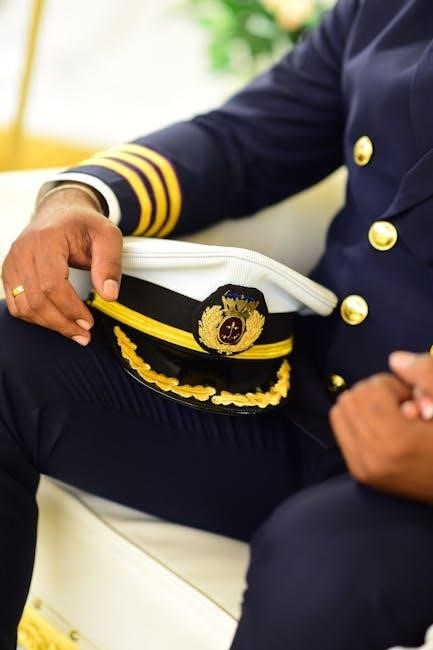
Overview of the PDF Guide for Warship Officers
The PDF guide is a comprehensive resource tailored for warship officers, focusing on Maritime English proficiency. It covers essential vocabulary, standard communication phrases, and specialized terminology for naval operations. The guide also outlines internal and external communication protocols, emergency procedures, and cultural awareness. Designed to enhance readability and practical application, it includes real-life scenarios and exercises. This guide serves as a valuable tool for officers aiming to improve their communication skills, ensuring clarity and precision in high-pressure environments. It aligns with international maritime standards, making it indispensable for effective and professional naval operations.
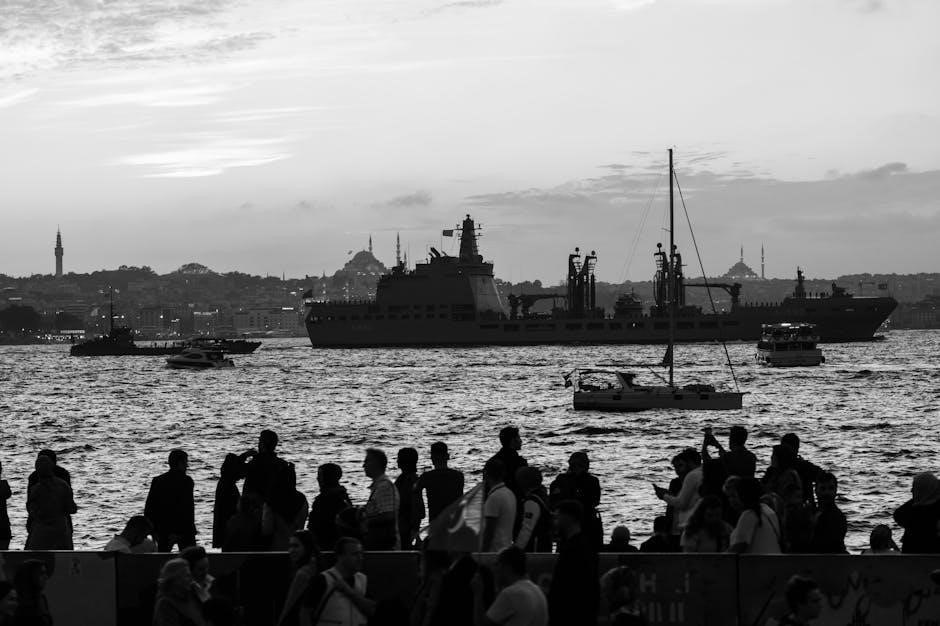
Key Components of Maritime English
Maritime English encompasses standardized vocabulary, clear communication protocols, and precise terminology essential for naval operations, ensuring clarity and accuracy in navigation, commands, and safety procedures at sea.
Essential Vocabulary for Naval Operations
Mastering essential vocabulary is critical for effective naval communication. Terms related to navigation, commands, and safety procedures are standardized to ensure clarity. Keywords include nautical terms like “port,” “starboard,” and “aft,” as well as specific commands such as ” anchor aweigh” and “all hands on deck.” Understanding these phrases is vital for executing orders accurately and maintaining operational efficiency. This vocabulary is consistently used across international maritime operations, enabling seamless communication among diverse crews. Proper usage of these terms ensures safety, reduces errors, and enhances overall mission success. Familiarity with this lexicon is a cornerstone of professional competence for warship officers.
Standard Phrases for Clear Communication
Standard phrases are crucial for clear communication on warships, ensuring commands and information are conveyed without ambiguity. These phrases, such as “Request permission to come aboard” or “All hands on deck,” are standardized to avoid confusion. They are used in routine operations, emergency situations, and navigation, promoting safety and swift action. Understanding these expressions is essential for all crew members, enabling precise execution of orders. Their consistent use fosters seamless coordination among officers and sailors, reducing misunderstandings. Proper communication protocols are vital for maintaining operational efficiency and ensuring the safety of the crew and vessel in all conditions.
Terminology Specific to Warship Operations
Warship operations require precise terminology to ensure clear communication and effective execution of tasks. Terms like “bridge,” “deck,” and “hull” refer to specific parts of the vessel, while “munitions,” “turret,” and “starboard” are critical for navigation and weapons systems. Understanding these specialized words is vital for officers to coordinate actions, maintain safety, and respond to emergencies. This unique vocabulary ensures that commands are executed without confusion, enabling seamless teamwork and operational efficiency. Mastery of warship-specific terms is essential for professional competence and effective decision-making in high-stakes naval environments.
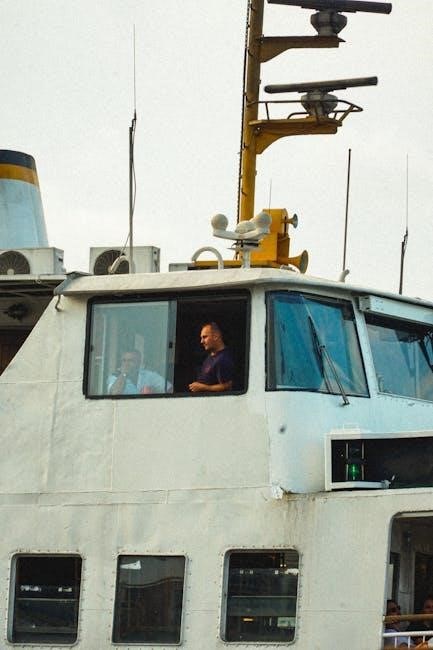
Communication Protocols on Warships
Communication protocols on warships ensure clarity and precision in conveying orders and information. Standardized phrases and procedures are used to maintain order and safety during operations.
Internal Communication Procedures
Internal communication on warships relies on clear, concise, and standardized protocols to ensure efficiency and safety. Officers use specific Maritime English phrases to convey orders and updates, maintaining a strict hierarchy of communication. This includes reporting procedures, status updates, and emergency alerts. Standardized language helps reduce misunderstandings, especially during high-stress situations. Regular drills and exercises reinforce these protocols, ensuring crew members understand their roles. Effective internal communication is critical for coordinating tasks, executing maneuvers, and responding to emergencies promptly. It fosters a disciplined environment where every command and response aligns with established naval procedures and international maritime standards.
External Communication with Other Vessels and Authorities
External communication involves interacting with other vessels, coastal authorities, and maritime organizations. Standardized Maritime English ensures clarity and professionalism in these interactions. Officers use precise language to share navigation plans, request assistance, or report incidents. Communication formats, such as Mayday or Pan-Pan messages, are strictly adhered to for emergencies. Effective external communication is vital for coordinating maneuvers, avoiding collisions, and complying with international maritime laws. It also fosters cooperation during joint operations or rescue missions. Officers must maintain professionalism and accuracy to ensure messages are understood correctly, upholding safety and diplomatic standards in international waters.
Emergency Communication Protocols
Emergency communication protocols are critical for warship officers to ensure rapid and accurate responses during crises. These protocols include standardized phrases and procedures, such as Mayday and Pan-Pan messages, to alert other vessels and authorities. Officers must clearly convey the nature of the emergency, location, and required assistance. Adherence to these protocols minimizes misunderstandings and maximizes response efficiency. Regular drills and training in Maritime English are essential to ensure officers can communicate effectively under stress. Proper use of emergency terminology and formats is vital for safeguarding lives and vessels in critical situations.
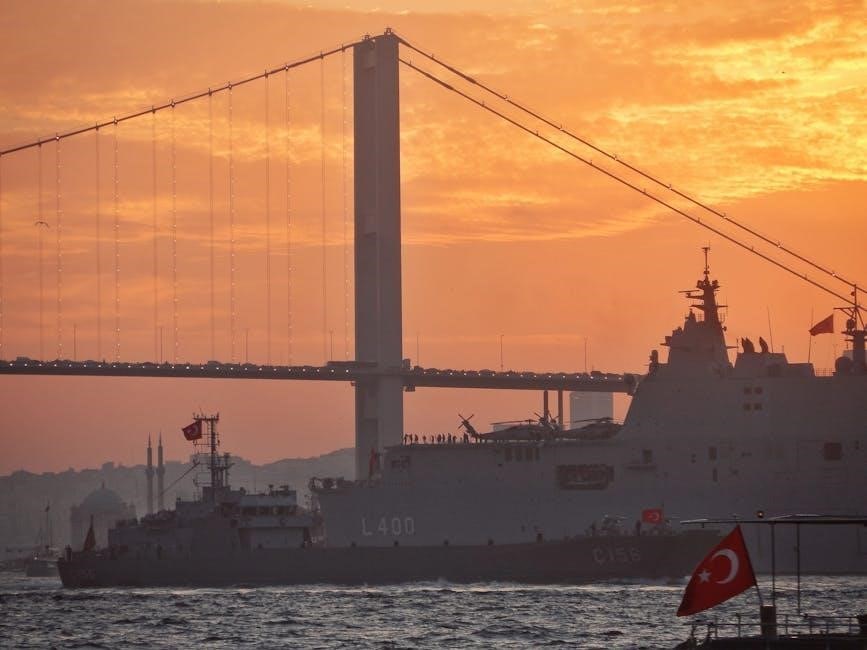
Certification and Training
Certification in Maritime English ensures warship officers meet international standards, enhancing communication skills and operational efficiency. Training programs focus on practical application, preparing officers for real-world scenarios and exams.
Importance of Certification in Maritime English
Certification in Maritime English is crucial for warship officers, ensuring proficiency in standard communication practices. It validates their ability to use precise terminology and follow protocols, enhancing safety and operational efficiency. Certified officers can navigate complex situations effectively, adhere to international regulations, and lead multinational crews confidently. This credential is often mandated by maritime authorities, making it essential for career advancement and compliance. By obtaining certification, officers demonstrate their commitment to professional excellence and readiness to handle the demands of modern naval operations effectively.
Training Programs for Warship Officers
Structured training programs in Maritime English equip warship officers with essential communication skills. These programs often include vocabulary building, practical exercises, and scenario-based simulations to enhance proficiency. Resources like “Maritime English Volume I and II” provide comprehensive learning materials. Officers engage in interactive sessions to master standard phrases and terminology, ensuring clear and precise communication. Additionally, these programs emphasize real-world applications, such as navigation procedures and emergency responses, to prepare officers for diverse operational challenges. Continuous learning opportunities, including online courses and workshops, further support professional development in Maritime English.
Role of Maritime English in Certification Exams

Maritime English plays a pivotal role in certification exams for warship officers, as it ensures proficiency in communication. Exams often include scenarios testing understanding of standard phrases, navigation terminology, and emergency protocols. Officers must demonstrate clear and precise language skills to meet international maritime standards. The certification process emphasizes practical application, such as interpreting weather reports or executing commands accurately. Resources like “Maritime English Volume I and II” are frequently referenced in exam preparation; Proficiency in Maritime English is not only a requirement but also a cornerstone for professional competence in naval operations, reflecting the importance of clear communication at sea.
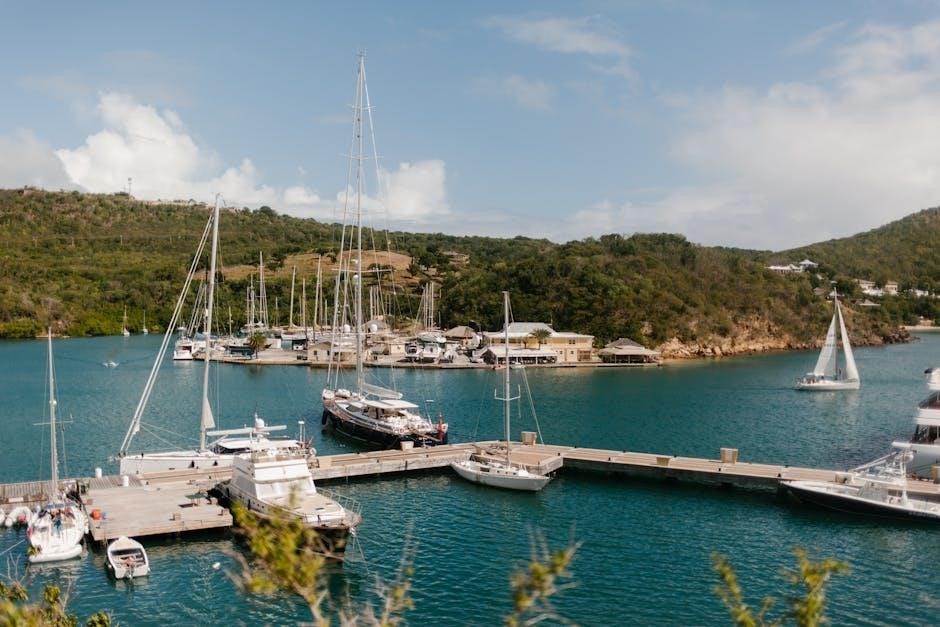
Cultural and Professional Awareness
Cultural and professional awareness is crucial for warship officers, ensuring respect and effective collaboration in multi-national crews. Understanding diverse traditions and professional etiquette fosters international cooperation at sea.
Cultural Sensitivity in International Maritime Operations
Cultural sensitivity is vital in international maritime operations, ensuring respect and cooperation among diverse crews. Understanding different traditions, customs, and communication styles fosters a harmonious work environment. Officers must recognize cultural nuances, such as greetings, dietary practices, and decision-making approaches, to avoid misunderstandings. Cultural insensitivity can lead to conflicts, hindering teamwork and safety. Maritime English plays a key role in bridging these gaps, promoting clear and respectful communication. By embracing cultural diversity, officers contribute to effective global maritime operations and uphold international standards of professionalism and cooperation at sea.
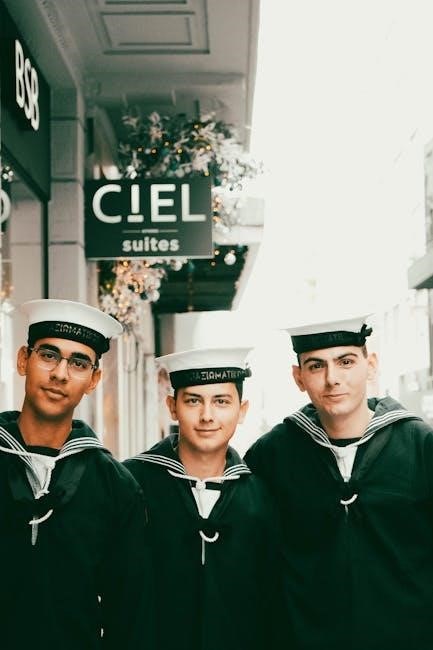
Professional Etiquette for Officers
Professional etiquette is critical for officers to maintain discipline and respect within a warship’s hierarchical structure. Clear communication, adherence to protocols, and courteous behavior ensure smooth operations. Officers must address superiors formally and treat subordinates with dignity, fostering a culture of mutual respect. Proper etiquette extends to international interactions, where cultural awareness is essential. Upholding these standards enhances teamwork, safety, and the ship’s overall efficiency. Maritime English training emphasizes these practices, ensuring officers can communicate effectively and professionally in all situations, both onboard and during external engagements, contributing to successful naval operations and global maritime cooperation.
Understanding International Maritime Regulations
Understanding international maritime regulations is vital for warship officers to ensure compliance with global standards. Maritime English facilitates comprehension of legal frameworks like SOLAS and MARPOL, crucial for safety and environmental protection. Officers must communicate clearly to avoid violations, ensuring adherence to protocols for navigation, security, and environmental practices. Knowledge of these regulations is essential for legal compliance, preventing incidents, and maintaining international cooperation. Proficiency in Maritime English enables officers to interpret and implement these rules effectively, safeguarding operations and upholding global maritime standards.
Navigation and Safety
Maritime English is crucial for navigation and safety, enabling clear communication of coordinates, weather conditions, and emergency procedures. It ensures precise commands and timely responses.
Maritime English in Navigation Procedures
Maritime English plays a vital role in navigation procedures, ensuring clear communication of coordinates, bearings, and commands. Standard terminology for directions, such as “bearing” and “heading,” is essential for precise maneuvering. Weather conditions, like “gale-force winds” or “fog,” must be conveyed accurately to maintain safety. Officers use specific phrases to relay positions, such as “latitude” and “longitude,” and to issue orders like “alter course to 270 degrees.” Effective use of Maritime English prevents misunderstandings, enabling efficient navigation and adherence to international protocols. It also facilitates the use of electronic navigation tools, such as GPS and radar, ensuring seamless operations at sea.
Safety Drills and Emergency Responses
Maritime English is critical in safety drills and emergency responses, ensuring clear communication during high-stakes situations. Standard phrases like “Abandon ship” or “Fire in the engine room” must be understood universally. Officers use precise terminology to coordinate evacuation procedures, damage control, and medical emergencies. Effective use of Maritime English prevents misunderstandings, enabling rapid and coordinated actions. It also ensures compliance with international safety protocols, such as those outlined by SOLAS. Clear communication fosters teamwork and accountability, crucial for saving lives and minimizing damage during crises. Regular drills reinforce these protocols, ensuring officers are proficient in both language and procedure.
Weather and Navigational Terminology
Maritime English includes specific terms for weather and navigation, enabling precise communication of meteorological conditions and positional data. Officers must understand terminology like “latitude,” “longitude,” “heading,” and “depth” to navigate accurately. Weather-related terms such as “storm,” “hurricane,” or “fog” are critical for safety. Standard phrases like “Reduce speed” or “Alter course” ensure clear instructions during navigation. Knowledge of navigational aids like GPS, radar, and compasses is essential. Accurate weather forecasts and navigational updates are vital for avoiding hazards and ensuring safe passage. Proficiency in these terms is crucial for effective decision-making and compliance with international maritime standards.
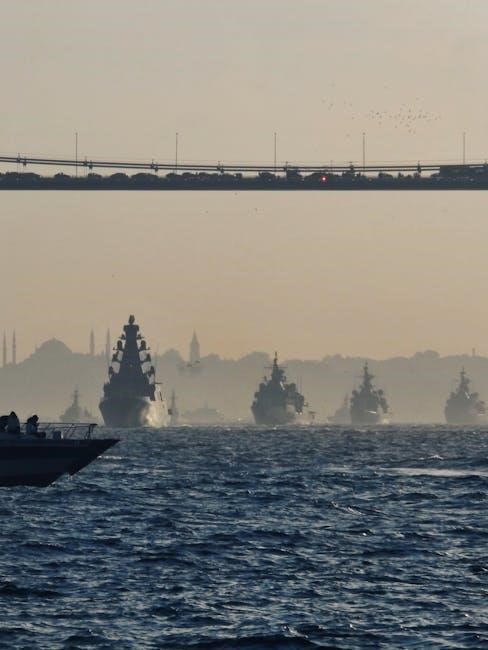
Leadership and Decision-Making
Effective leadership and decision-making are critical in naval operations, requiring clear communication and strategic thinking. Maritime English enables officers to convey orders and make timely, informed decisions.
Effective Leadership Communication
Effective leadership communication is vital for guiding crew members and ensuring mission success. Clear, concise language helps officers convey complex orders and decisions swiftly. Maritime English provides standardized phrases and protocols, enabling precise communication during high-stakes operations. Senior officers must articulate strategies clearly, fostering a culture of clarity and accountability. This ensures all crew members understand their roles and responsibilities, minimizing errors. Strong communication skills also enhance teamwork and trust among multi-national crews. By mastering Maritime English, leaders can maintain operational efficiency, safety, and morale, ultimately contributing to successful naval missions and international collaborations.
Decision-Making Processes in Naval Operations
Decision-making in naval operations requires clarity and precision, which Maritime English facilitates through standardized terminology and protocols. Officers must quickly interpret data and communicate decisions to ensure operational success. Maritime English provides the structured language needed for swift, accurate command execution. Clear communication minimizes misunderstandings, enabling efficient problem-solving and strategic planning. Effective decision-making also relies on understanding international maritime regulations and operational standards. By using precise language, officers can align actions with mission objectives, ensuring safety and operational efficiency. This structured approach to communication is critical for navigating complex naval scenarios and achieving successful outcomes in high-stakes environments.
Crucial Skills for Senior Officers
Senior officers must possess strong leadership, strategic thinking, and effective communication skills. Maritime English enhances their ability to convey complex orders clearly, ensuring crew understanding and compliance. Strong situational awareness and decision-making under pressure are vital, supported by precise language use. Senior officers must also manage multi-cultural crews, requiring cultural sensitivity and professional etiquette. Proficiency in maritime terminology aids in navigating international regulations and protocols. Continuous professional development ensures they stay updated on evolving naval practices and technologies. These skills collectively enable senior officers to lead effectively, maintaining operational excellence and safety in high-stakes maritime environments.
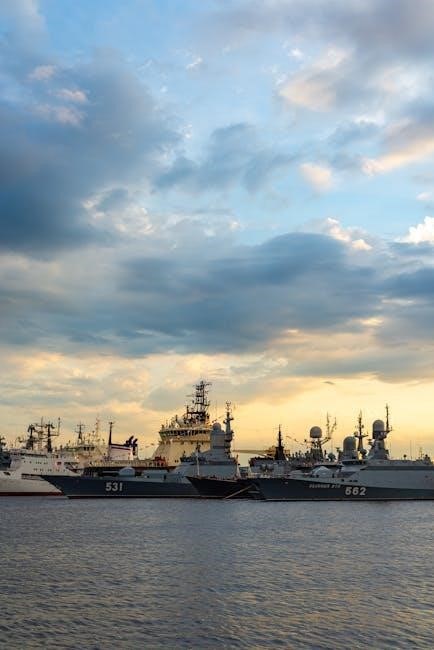
Resources and Continuous Learning
Access textbooks, online courses, and tools to master Maritime English. Continuous learning ensures officers stay updated on industry standards, terminology, and communication best practices for naval operations.
Recommended Reading for Maritime English
Key textbooks like Chapmans Piloting & Seamanship and Knights Modern Seamanship provide foundational knowledge. Maritime English Volume I and II by George Dounavis offer comprehensive guides tailored for naval officers. Additional resources include glossaries of nautical terms and study guides focusing on standardized phrases for navigation and emergency protocols. These materials ensure officers master the vocabulary and communication skills essential for effective command and crew coordination. Regularly updated editions reflect industry changes, making them indispensable for continuous professional development in maritime operations.
Online Courses and Tools
Several online platforms offer specialized courses in Maritime English, tailored for warship officers. These programs include interactive modules on navigation terminology, emergency communication protocols, and leadership skills. Tools like language learning apps and simulation software provide practical exercises to enhance proficiency. Additionally, webinars and forums hosted by maritime organizations facilitate knowledge exchange among professionals. These resources supplement traditional training, ensuring officers maintain high standards of communication and operational readiness in a dynamic, global maritime environment.
Importance of Continuous Professional Development
Continuous professional development is crucial for warship officers to stay updated on evolving maritime standards and technologies. Regular training ensures proficiency in Maritime English, adapting to new terminology and communication protocols. It enhances leadership skills, decision-making, and cultural awareness, vital for international operations. Professional growth also fosters a culture of safety, efficiency, and compliance with global regulations. By investing in ongoing education, officers maintain operational excellence and contribute to the success of naval missions in an ever-changing maritime landscape.
